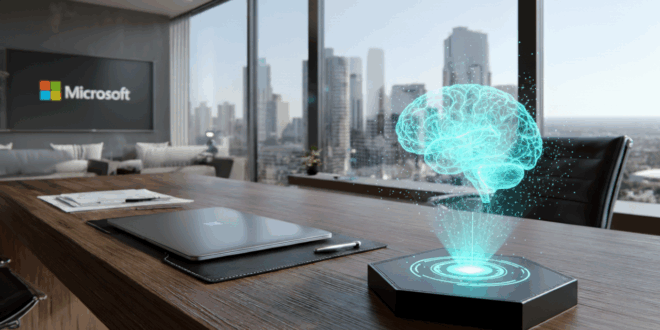The Redmond giant is determined not to let AI slip through its fingers. Under the leadership of Mustafa Suleyman, Microsoft aims to create a superintelligent AI that remains under human control.
Mustafa Suleyman, head of Microsoft AI and co-founder of DeepMind, has just announced the formation of a dedicated team focused on developing superintelligent AI. Their goal is to design a model that understands and acts at an exceptionally high level, always prioritizing responsibility.
A Superintelligent AI at the Service of Humanity
Mustafa Suleyman, the head of Microsoft AI (and former co-founder of DeepMind), recently published a detailed blog post outlining the company’s vision to create a superintelligent AI without risking human apocalypse. According to him, this AI will be neither uncontrollable nor autonomous, but rather “carefully calibrated, contextualized, and framed.” It will comprehend the world while remaining under human supervision.
Microsoft aims to build an AI that puts humans “at the top of the food chain,” as Suleyman puts it. Unlike competitors racing toward artificial general intelligence (AGI), Microsoft is choosing to reject this competitive mentality.
However, the situation is a bit more nuanced, as the company has entered into a special agreement with OpenAI. This allows Microsoft to develop its own general AI, either independently or in collaboration with other partners. Furthermore, Microsoft can leverage OpenAI’s intellectual property to create its own superintelligent models, suggesting an impending technological rivalry in the months to come.
What kind of AI does the world really want?
At @MicrosoftAI, we’re working towards Humanist Superintelligence (HSI): incredibly advanced AI capabilities that always work for, in service of, people and humanity.
And to do this we have formed the MAI Superintelligence Team. pic.twitter.com/cwregOiyY9— Mustafa Suleyman (@mustafasuleyman) November 6, 2025
Moreover, Suleyman describes three primary domains where this superintelligent AI could make a difference. First, daily life, with AI companions capable of assisting individuals in learning, creating, boosting productivity, and providing support in their tasks.
Next is healthcare, where Microsoft’s AI could aid professionals, enhance diagnostics, and make care more accessible to everyone. Lastly, research presents an ideal landscape for accelerating scientific discoveries, particularly in clean energy and sustainable technologies.
Suleyman summarizes Microsoft’s AI philosophy: “Humans matter more than AI. Our mission is a superintelligent AI that stands by humanity.” Microsoft aspires to build a powerful yet safe, ethical, and controllable AI.




